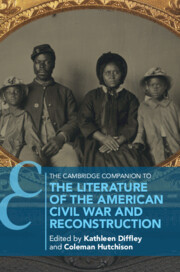Book contents
- The Cambridge Companion to the Literature of the American Civil War and Reconstruction
- The Cambridge Companion to the Literature of the American Civil War and Reconstruction
- Copyright page
- Dedication
- Contents
- Figures
- Contributors
- Acknowledgments
- Chronology
- Introduction
- Part I The Blind Ruck of Event
- 1 Violent Identifications
- 2 Reading, Sociability, and Warfare
- 3 Reconstructing the Civil War Literature of Injury, Illness, and Convalescence
- 4 “The Home and the Camp So Inseparable”
- 5 The Confederacy and Other Southern Fictions
- 6 The Civil War Ballad and Its Reconstruction
- 7 The Unfinished Drama of the American Civil War
- 8 Walt Whitman and the Reconstructive Impulse of Leaves of Grass
- 9 Reconsidering Moses
- 10 From “Facts” to “Pictures”
- Part II Worlds Made and Remade
- Suggestions for Further Reading
- Index
- Cambridge Companions to …
9 - Reconsidering Moses
Frances Ellen Watkins Harper and Reconstruction
from Part I - The Blind Ruck of Event
Published online by Cambridge University Press: 04 August 2022
- The Cambridge Companion to the Literature of the American Civil War and Reconstruction
- The Cambridge Companion to the Literature of the American Civil War and Reconstruction
- Copyright page
- Dedication
- Contents
- Figures
- Contributors
- Acknowledgments
- Chronology
- Introduction
- Part I The Blind Ruck of Event
- 1 Violent Identifications
- 2 Reading, Sociability, and Warfare
- 3 Reconstructing the Civil War Literature of Injury, Illness, and Convalescence
- 4 “The Home and the Camp So Inseparable”
- 5 The Confederacy and Other Southern Fictions
- 6 The Civil War Ballad and Its Reconstruction
- 7 The Unfinished Drama of the American Civil War
- 8 Walt Whitman and the Reconstructive Impulse of Leaves of Grass
- 9 Reconsidering Moses
- 10 From “Facts” to “Pictures”
- Part II Worlds Made and Remade
- Suggestions for Further Reading
- Index
- Cambridge Companions to …
Summary
This chapter explores Frances Ellen Watkins Harper’s neglected epic poem “Moses: A Story of the Nile” (1869). It argues that Harper harnessed the biblical story to create spaces for Black history, agency, and action, and thus placed Black voices at the center of debates over faith, the past, and the nation’s future. It recognizes that “Moses” was also a striking artistic experiment for Harper and a text deeply intertwined with her Reconstruction-era oratory. To support a close reading of the poem’s content and form, after establishing basic facts about “Moses” as a printed artifact, the chapter considers Harper’s 1867 and early 1868 lectures as corollaries to the poem’s composition, later 1868 and early 1869 lectures as critical to the poem’s final form, and both groups of lectures as paratexts. The chapter concludes by hinting at how this approach could shape consideration of a broader range of Reconstruction texts.
- Type
- Chapter
- Information
- The Cambridge Companion to the Literature of the American Civil War and Reconstruction , pp. 135 - 150Publisher: Cambridge University PressPrint publication year: 2022

